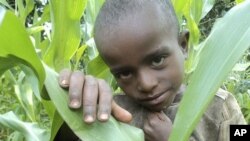A new book addresses the need for a sustainable diet to improve the health of people worldwide.
The Rome based international organizations, Food and Agriculture Organization, FAO, and Bioversity International have just published, “Sustainable Diets and Biodiversity,” a book that urges immediate action to improve the quality of diets for the world’s growing population. It says poor diets are linked to marked increases in non-communicable diseases, such as diabetes and cardiovascular diseases around the world.
Bruce Cogill, program leader for nutrition and marketing diversity at Bioversity International, says the focus of quantity and quality is a recent shift.
“What we’re doing in pointing out the issue of quality is that we don’t want to see a world where just calories are the focus of hunger programs. We talk about hidden hunger, micro-nutrients, for example, as being a major issue affecting two billion people. What the book does is look at diets from the point of view of meeting nutrient requirements,” said Cogill.
He said diet is not just about filling stomachs and getting away from the feeling of being hungry, nor does it only apply to parts of the developing world. He said it is also important in cities of developed countries.
The book said that with the rising incomes of developing economies, large numbers of people are abandoning traditional plant-based diets in favor of foods rich in meat, fat, sugar and dairy products. Also, the concept of sustainable diet may be interpreted in various ways around the world.
“We have a standard definition for sustainable diets, taking into account aspects of the environmental cost of the diet--in other words, you can eat animal source food taken from the forests that are not replaceable,” said Cogill.
He said a population in Kenya relies on meeting its nutritional requirements by eating bushmeat.
Cogill said while the Kenyan group considers that diet to be something that is important from a nutritional aspect, it is not something that is sustainable on a long term basis.
“We’re looking at the same kinds of issues with respect to increasing consumption of animal source food throughout the world, and saying what does it take to have populations consume the same level that we’re consuming in the West,” said Cogill.
Cogill said what this means is looking at sustainable diets from the standpoint of such factors as water, environment, nutrients, fertilizer, and fossil fuels, and what they cost on a regional, national and international level.
The Rome based international organizations, Food and Agriculture Organization, FAO, and Bioversity International have just published, “Sustainable Diets and Biodiversity,” a book that urges immediate action to improve the quality of diets for the world’s growing population. It says poor diets are linked to marked increases in non-communicable diseases, such as diabetes and cardiovascular diseases around the world.
Bruce Cogill, program leader for nutrition and marketing diversity at Bioversity International, says the focus of quantity and quality is a recent shift.
“What we’re doing in pointing out the issue of quality is that we don’t want to see a world where just calories are the focus of hunger programs. We talk about hidden hunger, micro-nutrients, for example, as being a major issue affecting two billion people. What the book does is look at diets from the point of view of meeting nutrient requirements,” said Cogill.
He said diet is not just about filling stomachs and getting away from the feeling of being hungry, nor does it only apply to parts of the developing world. He said it is also important in cities of developed countries.
The book said that with the rising incomes of developing economies, large numbers of people are abandoning traditional plant-based diets in favor of foods rich in meat, fat, sugar and dairy products. Also, the concept of sustainable diet may be interpreted in various ways around the world.
“We have a standard definition for sustainable diets, taking into account aspects of the environmental cost of the diet--in other words, you can eat animal source food taken from the forests that are not replaceable,” said Cogill.
He said a population in Kenya relies on meeting its nutritional requirements by eating bushmeat.
Cogill said while the Kenyan group considers that diet to be something that is important from a nutritional aspect, it is not something that is sustainable on a long term basis.
“We’re looking at the same kinds of issues with respect to increasing consumption of animal source food throughout the world, and saying what does it take to have populations consume the same level that we’re consuming in the West,” said Cogill.
Cogill said what this means is looking at sustainable diets from the standpoint of such factors as water, environment, nutrients, fertilizer, and fossil fuels, and what they cost on a regional, national and international level.














